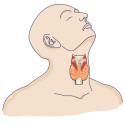Low Thyroid and Multiple Sclerosis
 Approximately 20 million people In the United States take some form of thyroid medication. An estimated 13 to 15 million additional Americans may be undiagnosed for low thyroid function. Although the exact numbers for individuals with Multiple Sclerosis are not established, in my clinical experience a fair number of people with MS have low thyroid function too. Why are so many people left undiagnosed who exhibit symptoms of low thyroid? One reason is inadequate testing for thyroid hormone levels and the sole reliance by traditional medical practitioners on lab results for a diagnosis, instead of also correlating symptoms. TSH (thyroid stimulating hormone) is the most common test performed, but it is not enough to establish adequate levels of each individual thyroid hormone. Also, the reference range for the TSH is too high leaving many people with low thyroid symptoms undiagnosed, and subsequently, untreated.
Approximately 20 million people In the United States take some form of thyroid medication. An estimated 13 to 15 million additional Americans may be undiagnosed for low thyroid function. Although the exact numbers for individuals with Multiple Sclerosis are not established, in my clinical experience a fair number of people with MS have low thyroid function too. Why are so many people left undiagnosed who exhibit symptoms of low thyroid? One reason is inadequate testing for thyroid hormone levels and the sole reliance by traditional medical practitioners on lab results for a diagnosis, instead of also correlating symptoms. TSH (thyroid stimulating hormone) is the most common test performed, but it is not enough to establish adequate levels of each individual thyroid hormone. Also, the reference range for the TSH is too high leaving many people with low thyroid symptoms undiagnosed, and subsequently, untreated.
Classic Symptoms of Hypothyroid
Symptoms of low thyroid include fatigue and weakness, weight gain, intolerance to cold, dry skin, brittle nails, irregular menses, PMS, infertility and miscarriage, elevated cholesterol, depression and anxiety, decreased libido, headaches, dizziness, poor memory and difficulty concentrating, constipation, hair loss, joint pain and muscle stiffness. In individuals with MS the underlying issues of fatigue, weakness, and cognitive problems can be more pronounced. The problem is people present with a combination of various symptoms and cannot get a diagnosis of low thyroid function because their TSH value falls within the lab tests normal range. The Journal of the American Academy of Endocrinology reported a number of years ago that the range for TSH is too broad. The authors felt that TSH numbers approaching the upper range of normal (4.25-5.0) may be indicative of hypothyroidism. My clinical experience is that TSH numbers above 2.0 often indicate a potential under activity of the thyroid.
How Does The Thyroid Work?
The thyroid receives information from the pituitary gland in the form of TSH. TSH then stimulates the thyroid to produce two hormones – T4 (thyroxine) and T3 (triiodothyronine). T4, which is relatively inert and T3, the more biologically active hormone are made by the body in a ratio of approximately 90:10. This thyroid ratio provides a steady pool of T4 to be converted into T3 at the cellular level. Once T3 enters our cells it activates certain enzyme pathways that increase cellular energy, protein creation, fat and carbohydrate breakdown, increased tissue oxygenation and vitamin and mineral utilization. All of this is critical for people suffering with Multiple Sclerosis.
More Effective Thyroid Tests
A more thorough assessment of thyroid function should include a Highly Sensitive TSH, Total T4, Free T4 and Free T3. It is very important to look at the free fraction of the hormone because it is the metabolically active form needed at the cell level. If the TSH is high, thyroid function is low. If the free fraction of the hormones is low, thyroid function is low. If all of these values fall within a marginally normal range but you are still symptomatic, another way of assessing thyroid function is by doing basal body temperatures. This involves taking an axillary (armpit) temperature before getting out of bed in the morning for 5-7 days in a row. If the average temperature is below 97.6 then you may be low in thyroid hormone.





